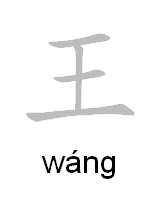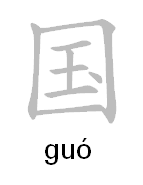Lesson Two: What’s Your Name?
Taking up where we left off, this lesson shows you how to introduce yourself as well as explaining some important things to bear in mind when speaking to those you respect. Some of the more common Chinese family names are introduced, which will help increase your vocabulary as well as add to the number of characters you should be able to write.
Conversation: 你叫什么名字?
学生:您贵姓?
Student: What is your surname?
老师: 我姓刘。你叫什么名字?
Teacher: My name is Liu. What’s your name?
学生:我叫王红。他叫李东。他是我的朋友。
Student: My name is Wang Hong. He is called Li Dong. He is my friend.
| New Words | ||
|---|---|---|
| 贵姓 | polite word your; surname = your surname please | |
| 什么 | pron. what? what kind of? | |
| 他 | pron. he, him | |
| 名字 | n. name, given name, first name | |
| 朋友 | n. friend | |
| 老师 | n. teacher | |
| 学生 | n. student | |
| 叫 | vb. call, name | |
| 是 | vb. (the verb to be) am, is, are; certainly, indeed | |
| 李 | n. Chinese surname | |
| 王红 | n. person's name, = Chinese surname, = red | |
| 李东 | n. person's name, = Chinese surname, = east | |
| 的 | pt. (grammatical word) |
Correct Usage
In Chinese the family name always precedes the given name. Surnames consist of one character, and first names one or two characters. China’s late Chairman Mao Tse-tung’s full name is 毛泽东 . 毛 is the surname and 泽东 is the given name.
In total, there are only around one hundred surnames in use. The most common family names are:
- 李
- 王
- 张
- 刘
- 陈
- 杨
- 黄
- 赵
- 吴
- 周
Conversely, there are an infinite number of given names. Given names can reflect a wish made by the parents or the circumstances and place of birth. As a result given names have meanings.
Sometimes male and female given names cannot be distinguished, though the meaning of the characters will give an indication. Female given names often include a character such as flower, beauty or perfume.
A friendly and familiar way to address someone is to use their family name preceded by 小 (little) or 老 (old). For example, 小王 (Little Wang). First names are rarely used.
For even more on Chinese family names, see Free Chinese Lessons list of Chinese Family names, which shows some of the more commonly used Chinese family names. The names are shown in Chinese, Pinyin and English. Examples of some famous people are also given.
Grammar Points
The verb 是 (to be)
Unlike the English verb “be”, in Chinese 是 does not change form when used after a personal pronoun. For example, “我是 …” , 你是…” or “他是…”
Grammatical word 的
The particle 的 is the most common character in Chinese. It is used with a noun or pronoun to indicate posession. For example, 他是我的朋友 “He is my friend.”
Polite word 贵姓
贵姓 is a polite way of asking someone’s surname. This polite form is used for elders and respected people such as teachers. The general usage is 您贵姓?
Exercises
Make at least five new sentences of your own using the following words.
- 贵姓
- 名字
- 朋友
- 老师
- 学生
Writing Exercises
As you learn to write more characters, you will see that many characters make up parts of other words.

is a Chinese surname. It also means king.

is the Chinese word for country.
This is the end of the second lesson. Spend as much time as you need practicing the chracters and their proper pronunciation before moving on to the next lesson.

Rex Thorsson
December 11, 2016 @ 8:31 pm
Great site! I am learning Chinese to help my daughter with her Chinese lessons. She is only seven but like me loves the language. Keep up the good work!
Genia
October 16, 2016 @ 12:20 am
i am loving this lesson. Thanks to the site providers. You guys are amazing, thanks for awakening my interest in Chinese language.Just over the lessons, i am already eager to sit over my laptop and practice through your tutorials.
Many thanks from me at Jilin University…
Joe Roberts
April 3, 2015 @ 5:46 am
This website has really helped me to learn Chinese better. However, I still cannot decide wether to study Japanese or Chinese, both are unique and interesting in their own way. Whatever I decide, I can count on this website. Its pretty amazing. Thanks. Arigato gozaimasu. Xiè Xiè.
francisco vazquez
May 10, 2014 @ 8:08 am
Dao bäxirén, muito obrigado. Eso haré.
Saludos
Francisco Vazquez
December 14, 2013 @ 9:12 am
At the end of the lesson you state:
“This is the end of the second lesson. Spend as much time as you need practicing the chracters and their proper pronunciation before moving on to the next lesson”
How am I suppose to practice the pronunciation if I don’t know how every word sounds since there are no audio files…? I can figure it out how to form phrases but I don’t know how they sound… Please help!!
Xue Hao
December 14, 2013 @ 9:54 am
You are right, Francisco. No audio files is pretty big omission.
This is something we are hoping to fix in the near future. Hopefully this lesson will still be useful to you while we’re working on it.
Dao bäxirén
April 1, 2014 @ 8:11 am
Olá Francisco
Para te ajudar, vc pode baixar alguns programas no seu celular, se for seu caso; eu sugiro o “Aprenda Chines Grátis” da Bravolol; não chega nem aos pés deste site, mas te dá uma boa ajuda nas pronuncias básicas, além de estar sempre à mão.
Espero ter contribuído.
Abraço
Chinese Student
October 8, 2014 @ 8:28 am
I am currently taking a Chinese class. Certain letters like :”x” is pronounced as “ch” and “q” is pronounced like “sh” there are also special rules. For example, the letter “z” when paired with “i” will just sound like a continuous “zz” instead of “ze”.
I cannot list everything, but here are just a few. Search up how to say the Chinese alphabet and it should be easier from there. Hope this helps!
我目前正在中国的类。像某些字母“X”的发音为“CH”和“Q”的发音类似“嘘”也有特殊的规则。例如,字母“Z”,与“我”只是声音,而不是“泽”就像一个连续的“ZZ” 配对。
我不能列出一切,但这里只是少数。搜索了怎么说,中国的英文字母,它应该是从那里更容易。希望这会有所帮助!
jasmine
December 7, 2013 @ 5:41 am
love it